Text
ΑΒΡΑΣΑΞ -- ABRASAX From a Hermetic Viewpoint.
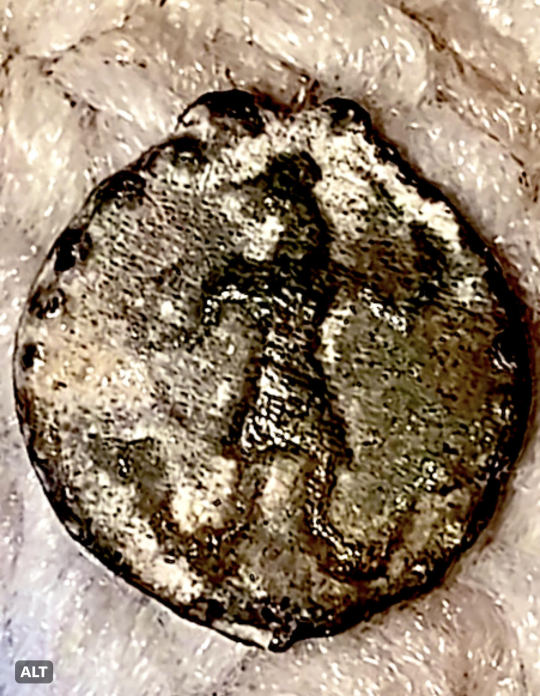
To the Gnostics, Abrasax is the great archon who created the whole world. There is quite a bit of nuance considering how Basilides Gnosticism views this deity. Nuance that I am not qualified to go over at the moment. Carl Jung refers to Abrasax as a truly terrible entity that encompasses all evil and all good, in his Red Book. I've seen negative reactions from people on Discord to this entity, but also some positive reactions.
But to the Hermeticist…who and what is this weird rooster head, snake-legged deity that is found all throughout the Greek Magical Papyri (PGM)? Let’s find out?
In the Discourse of the Ogdoad and Ennead (D89) we are given strings of vowels and nomina Barbara for the Hermetic student, namely Tat as he is being taught by Hermes. To Christian H. Bull in his The Tradition of Hermes Trismégistōs, the string of Greek vowels and nomina Barbara/voces magicae is the totality of the Kosmos. Tat asks to receive the imprint of fullness by ways of hymns of praise to God. Bull seems to agree with Alberto Camplani that the “imprint of Fullness (Pleorma)” is coded within these string of vowels and voces magicae.
From personal experiences — I have to agree with this, but I had to fuck around and find out for myself as I read this book many months ago when vowels and voces magicae were not big in my praxis. Anyways, here is the full hymn:
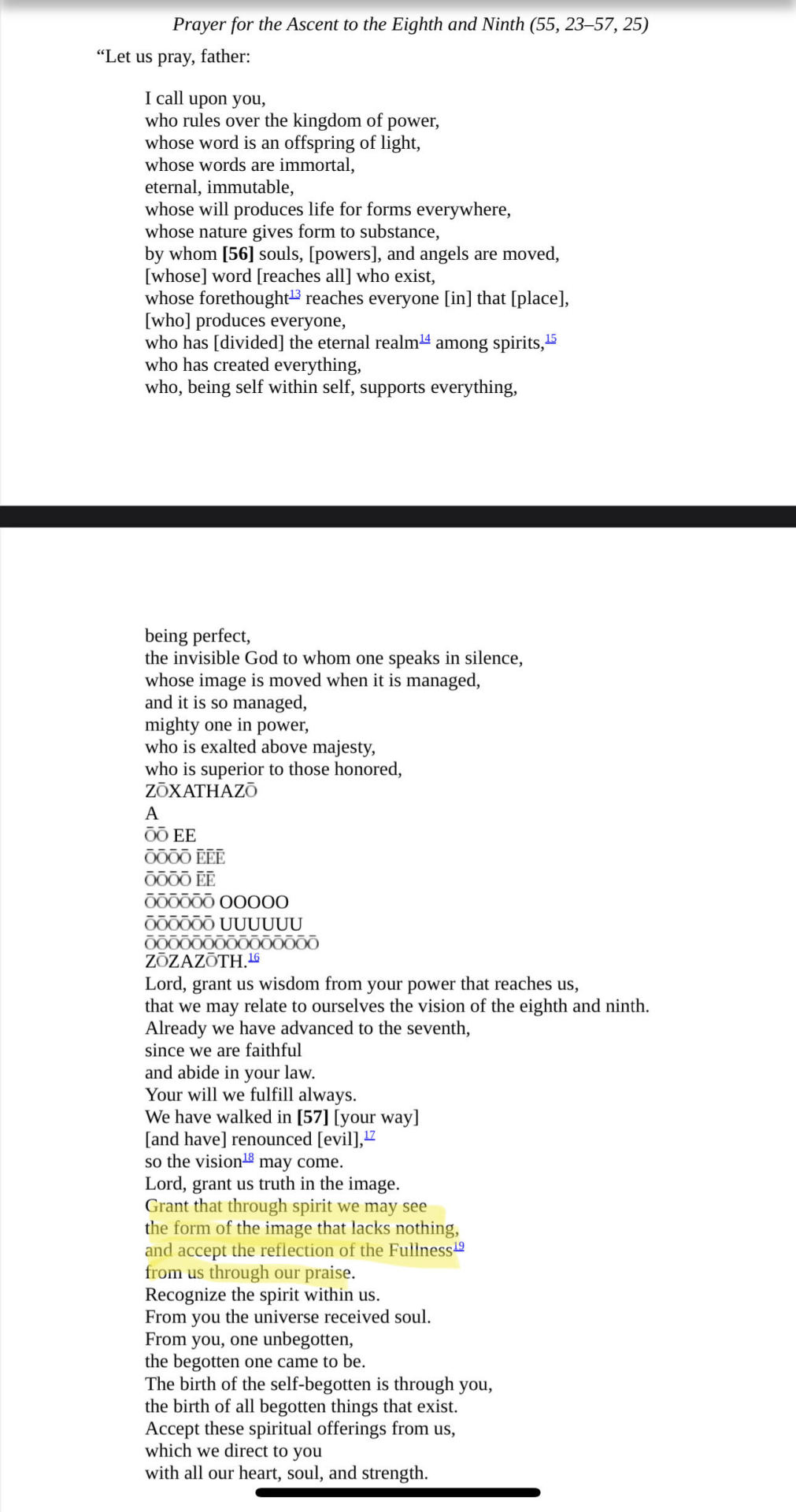
Great! So how does this tie into ΑΒΡΑΣΑΞ and what is this names value to a Hermeticist? For starters — This name, has a numerical value of 365, according to isopsephy. 365, as the majority of you know, is the totality of days our Earth revolves around the Sun. In PGM VIII. 1-63, specifically in lines 45-50… we see a love spell invoking Hermes to which we are given the name of ABRASAX equaling 365 explicitly, and quite possibly a voces magicae for Hermes.
The Sun's importance in Hermeticism is ever-present. Most explicit in my opinion is SH 2a from M. David Litwa’s Hermetica II:
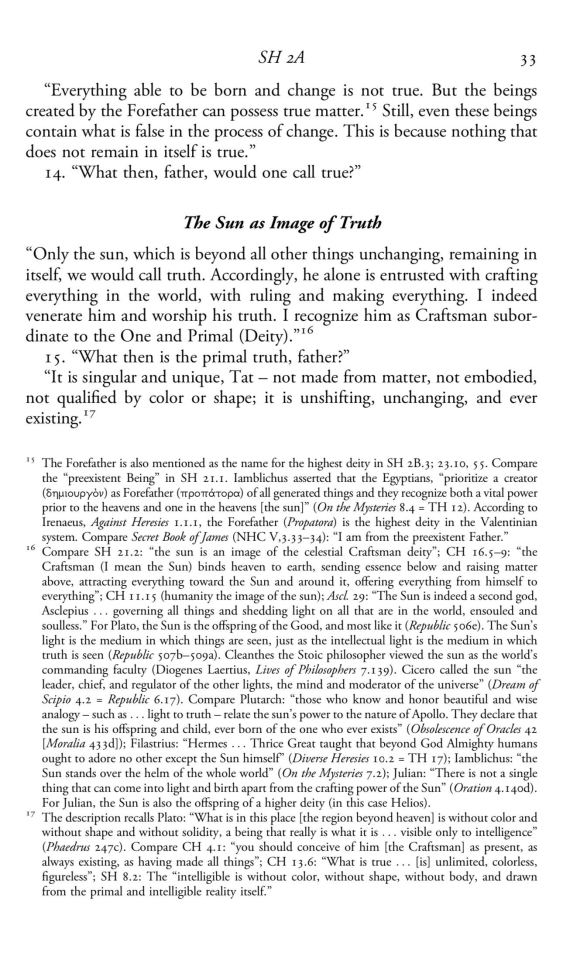
Also important to note: Thoth. Many believe Thoth is just the god of the Moon, yet Thoth has a Solar form: the Baboon. Baboons and their screeches are believed to be connected to the language of the gods. This is confirmed in the Demotic Book of Thoth. Where a scribe of Thoth’s Scribal College: The House of Life [𓉑], says this about the great teacher, Thoth:
"The signs revealed their form. He called to them and they answered to him. He knew the form of speech of the baboons and the ibises."
Thoth is also believed to be the creator of not just words and language but also vowels (Philebus 18b-c). For clarity's sake, Thoth is an extremely important figure in Hermeticism. Our teachings are based upon a syncretic god: Hermes & Thoth — Hermēs Trismégistōs.
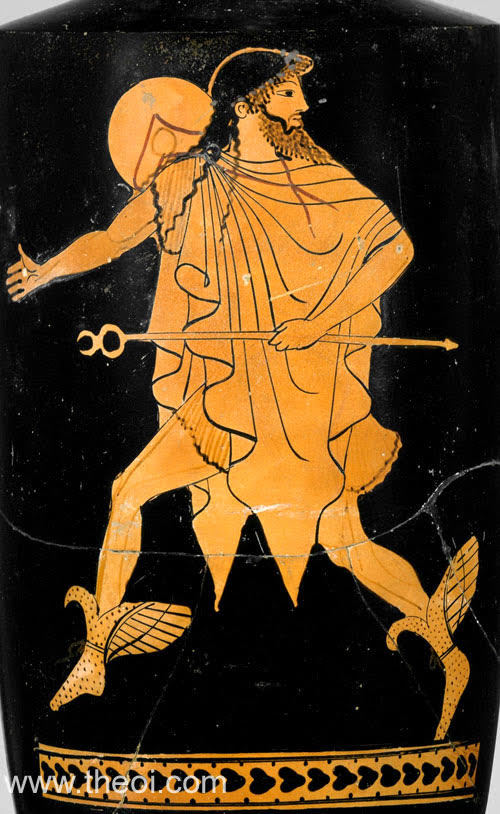
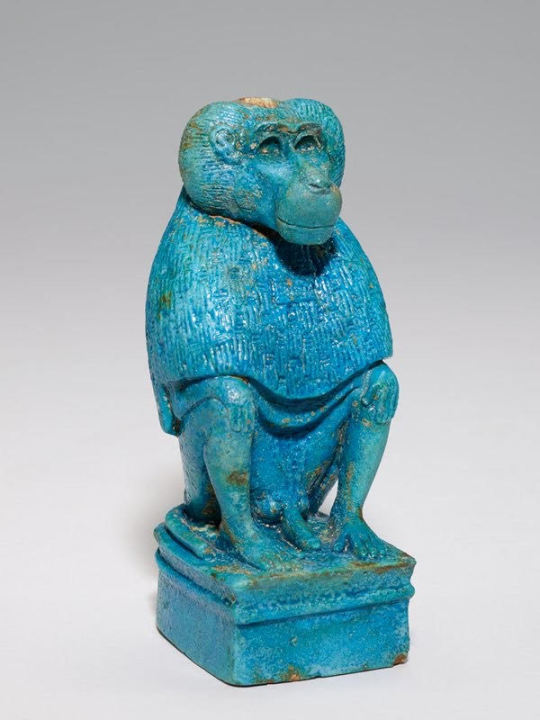
More evidence for the importance of ΑΒΡΑΣΑΞ is found in PGM XIII.1-343 — the famed Heptagram Rite, which we can perform more clearly and neatly here. This is a ritual that invokes Aiōn. Aiōn is believed to be the power of the Unknowable, Ineffable Godhead in Corpus Hermeticum XI. In lines 80-89 of PGM XIII, we are given voces magicae to Aiōn in 7 different languages as seen below.
Birdglyphic: ΑΡΑΙ
Hieroglyphic: ΛΑΙΛΑΜ
Hebraic: ΑΝΟΧ ΒΙΑΘΙΑΡΒΑΘ ΒΕΡΒΙΡ ΕΧΙΛΑΤΟΥΡ ΒΟΥΦΡΟΥΜΤΡΟΜ
Egyptian: ΑΛΔΑΒΑΕΙΜ
Finally, in Baboonic: ΑΒΡΑΣΑΞ
(The voces magicae for Aiōn is continued in 'Falconic' and lastly hieratic languages). Thus, we can see a clear link to baboons and Thoth, the name Abrasax to the baboons, and their "language." We see a connection between Aiōn and Abrasax, and we also saw above in PGM VIII that it could also be used as a voces magicae to Hermes!
But let’s look at the imagery as well. A rooster head with snake legs. The legs, to me, are Chthonic of course, and curl up to shape an Ω, the seventh sphere, Saturn. The connection to Omega is something Christian H. Bill points out. The rooster is also a Solar animal. So to me, we have a beautiful image representing the totality of All Things from the Sun whose an image of Truth, directly subordinate to the One Primal Deity (SH 2a), down to the Du’at/Underworld. Both Hermes and Thoth are connected to the Underworld as well as the Sun. Hermes' planet, Mercury is the closest planet to the Sun. Hermes is also famously known as a psychopomp, a traveler and mediator between Hades and Mount Olympus, Death and Life. Thoth, with His solar connections stated above, is also a key member of the Ancient Egyptian Underworld. In the Ani Papyrus, we see Thoth as the recorder/scribe that lists every heart that is weighed up against the Divine Feather of Truth -- Ma'at.
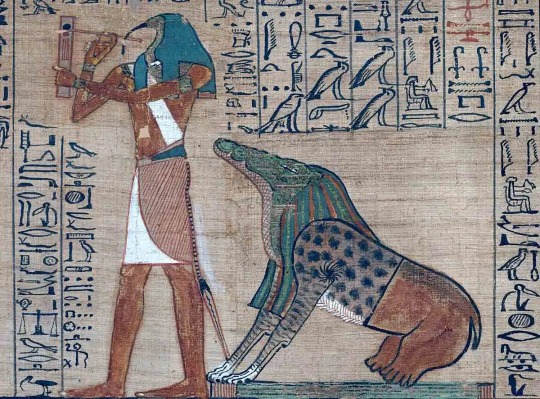
Thus what we have here, from a Hermetic standpoint, is that Abrasax is not a malevolent archon or a demon as denoted by the early Catholic Church, but rather a beautiful deity that is worthy of reverence whose name equals our revolution around the Sun, the Image of God. Abrasax — a name that is connected to both Hermes and Thoth, for reasons stated above. A name that also has a connection to Aiōn, an extremely important power/god in Corpus Hermeticum XI.
That is my interpretation, from a Hermetic standpoint. There are many interpretations of this elusive yet captivating deity. Abrasax can be a voces magicae for Hermes, or for Aiōn, it can be what I said, or you can take the Gnostic approach, or Jung, or Catholic approach to Abrasax. Regardless of what you do with the information, I shall continue to raise my voice in jubilation and cry out:
ΧΑΙΡΕ ΑΒΡΑΣΑΞ !
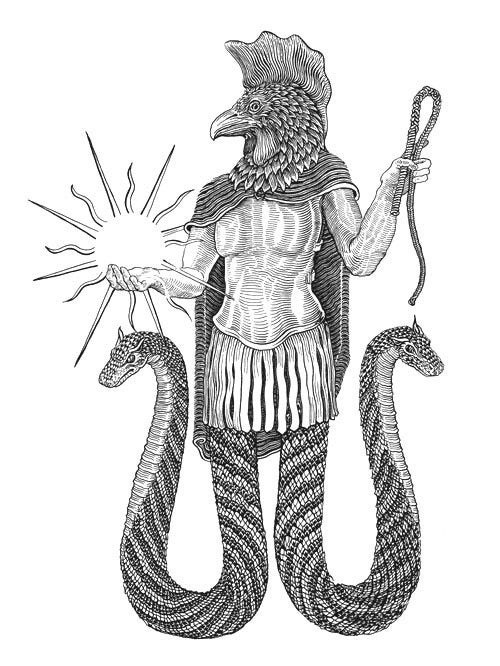
#hermeticism#gnosticism#demon#aion#greek magical papyri#corpus hermeticum#Ogdoad#ennead#nag hammadi library#Abrasax#archon#hermetica#magic#ritual#spells#hermes trismegistus#hermes#thoth#greco egyptian#egyptian#Greek#mythology#underworld#sun
4 notes
·
View notes
Text
Reading the Hermetica
So, even though there’s been a slight uptick in activity here on my blog over the past few weeks and months compared to what went before (not that I ever truly went quiet or shut up, but long-time readers will know I have my own ups and downs), it’d be remiss of me to not point out that I’m still keeping active in general. As it turns out, I have something of a writing stamina gauge of sorts: if…
View On WordPress
4 notes
·
View notes
Text
Chaldean Oracle Verse 147, Gate of Man and Gate of Immortals, Cancer/Capricorn, and Daniel.

If you speak to me often, you will perceive everything in lion-form. For neither does the curved mass of heaven appear then nor do the stars shine. The light of the moon is hidden, and the earth is not firmly secured, but everything is seen by flashes of lightning.
If you often invoke me all things will appear to you to be a lion. For neither will the convex bulk of heaven then be visible; the stars will not shine; the light of the moon will be concealed; the earth will not stand firm; but all things will be seen in thunder.
Disclaimer: This post is part of my original line of posts of my own blog where I...you guessed I ramble about stuff even if I am wrong because why not. Take it with a grain of salt AND if you actually know what the verse actually mean and want to correct me please go ahead.
In the sixth hour you have the form of a lion; your name is ΒΑΙ ΣΟΛΒΑΙ (BAI SOLBAI), the ruler of time.
"the light of the moon is hidden" reference to Cancer.
Summer tropic is in Cancer, and the winter tropic in Capricorn. And since Cancer is nearest to us, it is very properly attributed to the Moon, which is the nearest of all the heavenly bodies to the earth. But as the southern pole, by its great distance, is invisible to us, hence Capricorn is attributed to Kronos (Saturn)
in On the Cave of the Nymphs by Porphyry:
Homer was not satisfied with saying that it had two gates, but adds that one of the gates was turned towards the north, but the other which was more divine, to the south. He also says that the northern gate was pervious to descent, but does not indicate whether this was also the case with the southern gate. For of this, he only says, "It is inaccessible to men, but it is the path of the immortals
You can kinda see the similar gnosis/insight people have to associate Helios with Hecate in that sense if you attribute this oracle line to Hecate like Psellus did.
Porphyry clearly states that the signs from Cancer to Capricorn, which constitute the descent of a soul into a body, are situated in the following order: and the first of these is Leo, which is the house of Helios (the Sun); afterwards Virgo, which is the house of Hermes (Mercury); Libra, the house of Aphrodite (Venus); Scorpius, of Ares (Mars); Sagittarius, of Zeus (Jupiter); and Capricornus, of Kronos (Saturn).
“But from Capricorn,” he adds, the ascent is naturally “in an inverse order.” That is, in an inverse order on the opposing curve of the wheel of the zodiac. Aquarius is attributed to Kronos; Pisces, to Zeus; Aries, to Ares; Taurus, to Aphrodite; Gemini, to Hermes; and in the last place Cancer to the Selene (the Moon), only upon the soul’s descent into a body is the sun’s sign (Leo) encountered.
This is basically the whole dichotomy of Metatron and Sandalphon, because you get that similar connection between Malkuth/Kether and Enoch/Elijah, what I see personally is this hinting toward merkavah and Hekhalot literature where you descened to the chariot/merkavah. In a way I can definitely say the hints are astrologically coded but the practice itself isn't astrological strictly.
the whole descent into mysteries is in that verse, the curved mass of heaven nor do star shine IS THE LITERAL HEAVEN if you scry them or work through the gates of merkavah. The light of the moon is hidden and earth is not secured because you're reaching a place that's not "here" in the objective sense of the world, everything is seen by flashes of lighting is very apt way to describe how you actually see stuff there! almost very reminiscent of dreamy visions where everything is remembered haphazardly !
In summary the astrological hints are just symbolic not practically invalid but not restrictive into it, since the sun/lion-form is the first thing that come after Saturn in descent and last thing before Moon then you can see the hint THERE. It's not lion, but the sun which when it shine so brightly it will hide the rays of the moon, you can see that the sun is both what we can fall into and we can rise through.
I definitely felt very excited to share my hot take about this oracle line, because it is rather very related to some other blogs that I did work with.
Now...dare I say that these lion forms is what Daniel saw in the pit when he got thrown? notice how Daniel immediately start having visions after the lion pits from Daniel 6 to 7, it is an immediate jump.
Daniel in the Lion's Den c1615 Peter Paul Rubens
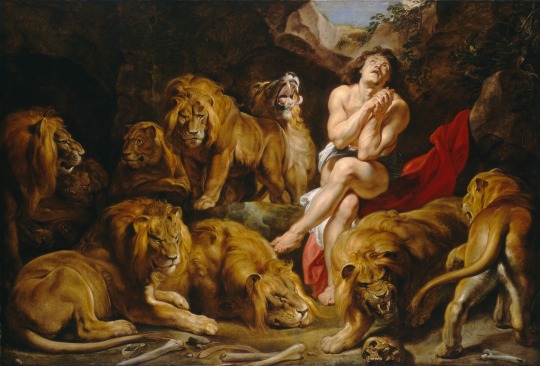
8 notes
·
View notes
Text
ABLANATHANALBA's water
This is the last and practical part of the two series blog posts I wrote, for reference. If you want to read them I will link them in the end of this post, but for now I will focus on actually transmitting water and by that I mean actually consecrating water and seeing how it's affected by this formula. I decided to try experimenting with bottled spring water and checking for myself the effect on water.
control water, CONTROL .
water with the name inside of it, IN .
water with the water outside of it, OUT.
water that's consecrated by the name, CONS.

The incantation I used was “You’re water, you're not water but the elixir of IAO, You’re water, you're not water but the Light of Abrasaxm IO IO IO IAO" "Ablanathanalba"(7 times)
Only for the consecrated water, I want to check if the water can be affected with the formula, without consecrating it. This was a big moment for me personally because it would test the previous two blog ideas I personally had about this formula. I chucked the bottles in the freezer and let them set for around 2 days and came back to check on the way they froze. The following is the results:

Welp if anything...IT WORKED! and I was extremely happy to know that it worked. The order of freezing fastest was:
OUT - CONS. - IN - CONTROL
Clearly more interesting than what I expected.
The text with the formula on the outside, froze the fastest but it was not uniform freezing. The Freezing chunk looked more like a "shock" through the water.

On the otherhand the consecrated water froze more uniformly and slower but faster than the one with text inside of it and the control bottle.

The one with text inside of it froze the slowest in comparison to the previous two, surprisingly the freezing was just around the text itself mostly and situated like a column in the middle.

Lastly The control/normal water, the only water that had a CLEAR chunk of ice. In comparison to all other, this ice seemed the one with normal pattern of freezing.

In conclusion, I writing on the outside of the vessel and consecrating the vessel seems like the most effective technique for magically enchanting water, that's the best takeaway from this trial. The other conclusion is that the formula work for the process of indirectly consecrating it, no wonder it is used in other spells for protection, compulsion, and binding.
10 notes
·
View notes
Text
Greek Magical Papyri-esque Holy Water.
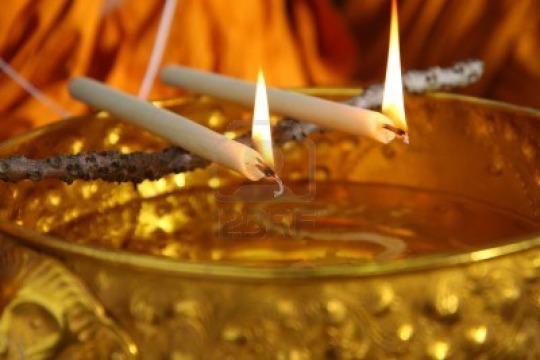
A little continuation from an earlier post I made about how I frame the Preces Templi E-book to my own praxis. I couldn’t include everything in that one post. Somethings just slip the mind, especially with this this old rusty noggin.
As the title suggests, I’d like to share with you all how I prepare Holy Water from a Greco-Egyptian standpoint that is really straight forward, using incantations as provided by @polyphanes Preces Templi E-book which I will link the E-book and his ko-fi shop at the end of this post.
Step 1) simply prepare a Tupperware or your designated container for holy water with clean, cold filtered water (any water will typically do).
Step 2) add a dash of salt used specifically for religious/spiritual/occult means. For the way I consecrate my salt: simply meditate over a container of your salt of choice (pink Himalayan for me) for 5-10 minutes. Clear the mind with the intention that power and sanctity will be infused into the salt. Then, after gently become aware and present after meditating, recite this incantation from 5.4 from the Preces Templi:
Hail to you, holy and great NN.! By your blessing and by this offering I make to you, be gracious to me, be merciful to me, and be propitious to me! (Repeat this 3 times).
For the NN here, for specifically consecrating salt, I simply add Netjeru and Theoi. So: “Hail to you, holy and great Netjeru and Theoi!”
Simple. This is a general “Dedication of Offerings” prayer and can be used for when presenting specific offerings for a deity. Here, I just use it to consecrate my salt!
Step 3) after you have added a dash of concentrated salt to your soon to be holy water, not it’s time to add a dash of natron. Just a little will do.
Step 4) now that all your ingredients have been mixed into the water, you’re going to want to meditate again for another 5-10 minutes. This is to further clear the mind with the intention of power and sanctity will enter forth via the salt and natron, and thus spread all throughout the water.
Step 5) after gently awakening from the second meditation with your salt and natron added into the water, you’re going to want to repeat this incantation from the Preces Templi 5.1 titled, “Prayer of Water.” Polyphanes bases this off of PGM IV.225ff, PGM IV.2967—3006, and PGM XIII.610ff. It goes as follows:
O sweet water, cool water, cool water that purifies the gods, you are a gift to the world and to me from the gods! The heavenly gods give the rain; the earthly gods give the seas; the beloved kings give the rivers; the beloved dead give the springs. As water from dew, you adorn the Earth and permit things to grow; as water from clouds, you adorn the Sky and permit things to be nourished. O water, for the sake of purity and becoming pure, be purified!You are pure, o water, and being pure, you wash the gods and all the world; you who wash the gods and all the world, so too wash me! You who are a gift to me, purify me, adorn me, and nourish me! (Repeat this 3 times).
Then boom, that’s how I make PGM-esque Holy Water! Enjoy :)
TO CONSECRATE STATUES WITH THIS HOLY WATER:
Simply lay the idols in the Tupperware of holy water, or if your container is too small, simply use your hands to scoop the water and shower it over the idol. Either way, for the way I do it, you’ll want to recite that “Prayer of Water” incantation as your idols are either submerged, or pouring the holy water over the idol till your heart is content. In between reciting the “Prayer of Water” I also recite:
Come to this statue, NN [deity]! Come forth and reside here In this statue I, NN [here I enter a magical pseudonym or you can simply just say your birth/chosen name of choice] , have prepared for you, NN [deity]! Abide in this statue, Abide in my shrine, Abide in my life o beautiful NN [deity]!
That’s pretty much it folks. Enjoy (again) :)
https://ko-fi.com/s/751c99dfa9
https://ko-fi.com/polyphanes/
7 notes
·
View notes
Text
Note in the Chaldean tradition (from Ruth Majericks translation of the Chaldean oracles) Erōs or Love is first Virtue to “leap” from the Paternal Intellect (Proclus commentary on the Paramendies/fragment 42). Later in fragment 44… we the Father mixing our souls with three things: Intellect, Divine Will, and pure Love which is stated “as the guide and holy bond of all things.”
Love is what drives binds and bounds all of creation. Lest us never forget this transcendental teaching. Great post OmE 🙏
Love: a big virtue and a essential key to magic.
And now abides faith, hope, love, these three; but the greatest of these is love.
1 Corinthians 13
Faith and hope will cease when the things believed in and hoped for appear. But love then becomes even greater and more ardent.
John Chrysostom
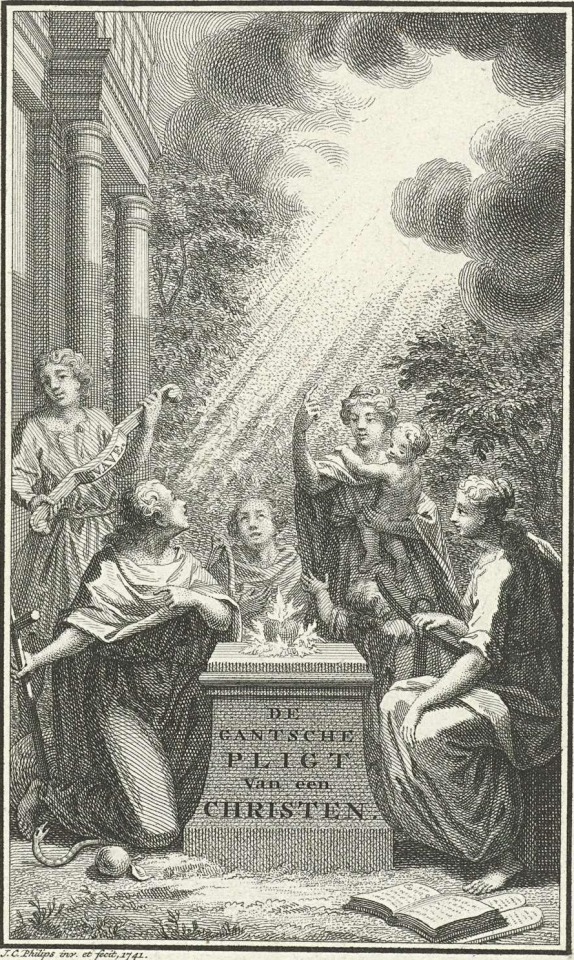
Love is such an essential thing to keep us going, both in magic, and many other occult and spiritual endeavor. Without love the whole process of what we are doing will be a chore, there won't be a push nor enjoyment in our work. Even when we do have faith and hope, Love rules over and is the greatest of virtue in this work, if it is meditation, cultivation, magic, mediumship, divination, spirit work, and so on once you put the love into and cultivate the love within you for it then it starts opening up for you.
Of course something also important is discipline and the Saturnian focus, but that's not what I am trying to bring on the table here at this moment. The love or the crush that you have to someone isn't something that really can be cultivated or artificially generated. Love, which will unite Man through a fraternal link, is a consequence of Plato's theory on universal love as a Law of Nature. Socrates said: "Love is neither a god nor a mortal, but a great devil," that is, a great Spirit which presides over universal love.
That's the same way we can see the cards of tarot: lovers, the wheel, the devil, the chariot, and other like moon, sun, and judgement. These all are an expression of love, of working with love, of directing, being directed, and being ruled over by love. Maybe in that sense what I am saying that is think of it even practically can you FORCE yourself to love sitting down to meditate? no, you can't. Love is the outpouring of the heart from the experience of life.
This is the practical teaching and open secret to making big progress, to love your work, to love your spirits, to love your divination, to love your rituals, and love your altar, to love gods, humans, friends, and enemies in this joyful heartwarming pouring out of your center/self.
in Conclusion and simplicity, let the Love be the virtue that opens all other virtue, be the key and the door, that's why Love can bring guidance if you truly love and yearn for the teaching and guidance,
Amen.



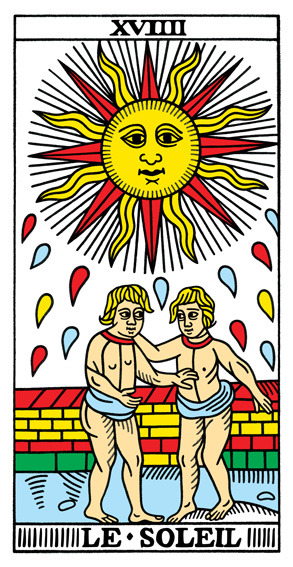


24 notes
·
View notes
Text
Commenting on a Line and Commentary from the Yellow Emperors Hidden Agreement 黃帝陰符經 as Commented by Yu Yan 俞琰 (1258-1314)

In [human] nature there are skillfulness and clumsiness; they can be hidden and stored.
Commentary by Yu Yan:
Among people, there are those who have knowledge and those who are foolish. Therefore their nature differs in skillfulness or clumsiness. With regard to [the statements] "great knowledge seems to be foolish" and "great skill seems to be clumsy," (they mean that] one's nature is hidden and stored within and is not perceived by other people. There fore it says, "in [human] nature there are skillfulness and clumsiness; they can be hidden and stored."
Why would one hide their intelligence; their skill? This is not saying to be “fake” or to come across as ignorant or appearing to be “skillful” by hiding ones “clumsiness.” There is a few things that come to mind on why it’s best to “hide our skillfulness and clumsiness.”
[NOTE: this is not an explanation on *how* to hide these things. The *how* can only be transmitted from teacher —>student from my understanding. I am musing on this for my own understanding. I am in no way encouraging anyone, nor myself to starting “hiding.” This is just to explain and help myself understand why it is good to “hide”].
For when we display our intelligence or our clumsiness so blatantly, these create preferences. To have human based preferences is a big no no in the Zhuangzi (chapter 2) and Huainanzi (1.5). The Huainanzi has this to say about preferences and our perception of them:

"When perception comes into contact with things, preferences arise. When preferences take shape and perception is enticed by external things, our nature cannot return to the self, and the heavenly patterns are destroyed."
Zhunagzi chapter 2 齊物論 gives a long dialogue on why “this is” & “this isn’t” truly misses the mark of things:

[2.11.15] "In such a way the Sage brings about harmony by taking “it is” and “it is not” and let’s them rest on the potter’s wheel of Heaven."
[12.12.4] "The manifestation of “this is” and “this is not” is what diminished the Dao."
[2.14.14] "Everyone else distinguishes things in order to impose their views on each other. Therefore, I say that in such “distinction” there is a failure to recognize."
Thus when we overtly and blatantly display our intelligence and or clumsiness, we create artificial perceptions of “I am this” and “I am that” or “I am not this” and “I am not that”. Such an err. Heaven makes our distinctions for us; Heaven has divided the ten-thousand kind of entities, and the seasons into their proper and respective places. We should follow Heaven and accord ourselves with its spontaneity 自然; for our own ziran is the same of Heavens.
So to circle back to the Yinfu Jing — the “statements” Yu Yan refers to are from Laozi 45. What do they mean? I think this is a teaching that alludes to the last of the three treasures 三寶 as mentioned in Laozi 67: 不敢為天下先. Literally it means “dare not to be first.” When we “dare not to be first” or more Simply be modest, we comply with Heaven and it’s own natural and spontaneous distinctions. For by hiding our skill and clumsy natures, we encourage the One Hundred Families to not have preferences set towards us.
This is why indeed “great knowledge seems to be foolish” and “great skill seems to be clumsy”. For when great knowledge makes itself known, we fail at 不敢為天下先, Which destroys Heavenly patterns and bars our nature from returning to the self (Huainazi 1.5).
Furthermore, this is further confirmed by Heshang Gong and his commentary on the Laozi 45: "Great skill seems as though clumsy."
大巧若抽,大巧謂多寸術也。若拙者,亦不敢見其能。
Great skill means abundantly talented and skilled. Those who "seem as though clumsy" simply do not show their abilities.
This why those who “do not show their abilities” namely the things hidden and stored as mentioned in the Yinfu Jing, seem to be clumsy, but truly they are not. For people who hide have returned to the true essence of reality 無極 — Ultimate Nothingness.
So, in conclusion as I understand Laozi 45 and the things “hidden and stored” in the Yinfu Jing — this brings about a certain clarity and tranquility that brings all under Heaven into alignment. We should let go of our preferences, or rather we must know when to stop having so many of them. For biases and preferences are evolutionary built into us for survival purposes. This is something neither you nor I can get around. Ideally, when I and the reader gains a teacher in such profound mysteries — we can learn how to properly do this without harming ourselves.
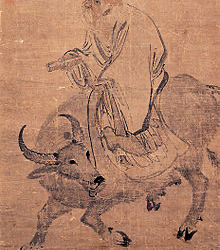
#Yellow Emperor#Neidan#daoism#Taoism#Laozi#chinese philosophy#Zhunagzi#huainanzi#Yu Yan#internal alchemy
4 notes
·
View notes
Text
Demiurgy and How a Confucian Passion for Learning Can be Considered As Such.
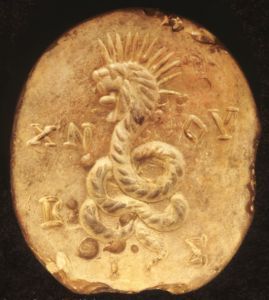
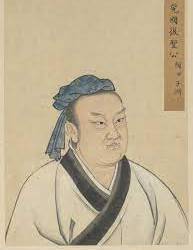
What is Demiurgy? As the author of Egyptian Mystic Polytheism so succinctly puts it:
Demiurgy is a type of “devotional act.” A devotional act is any activity outside of direct prayer with a religious purpose and significance. What makes “demiurgy” unique as a type of devotionalism is that it is principally concerned with the act of creation. Like theurgy, to mimic the gods and pursue likeness, one must participate in creativity as a lesser version of God’s creation. Producing, crafting, constructing, and creating are all acts that mimic the “Demiurge” or “Creator Deity.”
So, essentially, these are mundane activities that are performed with the intention to ritualize and devote said craft to the Demiurge, the Creator god of the Cosmos. As the quote above mentions, this is similar to theurgy in that these mundane activities help us mimic the Creator.
With that out of the way, lets take a look at Corpus Hermeticum XI.22, which I think supports such ritualized "demiurgy:
Mind is seen in the act of understanding, God in that act of making.
This sentence refers to God’s literal creation of All Things and how He is seen through His creation, as this whole preceding paragraph refutes the idea that God is entirely invisible and “unseen.” For context, here is the passage:
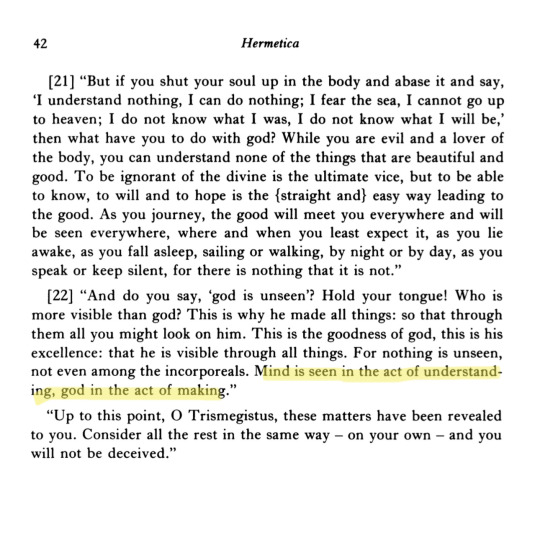
In Corpus Hermeticum V, we are told God is invisible and entirely visible. For us to understand God, we must become like Him (Corpus Hermeticum XI.20), as so much as that is possible, in each of our Fated predispositions. A way to do so is to create things ourselves through begetting, making music, writing, or exercising, i.e., our own Demiurgy. You can find a list here if the reader wants a more comprehensive list of things that can be considered a devotional act to the Demiurge -- Demiurgy. So essentially, if God is seen in His Creation, we too can see the Demiurge manifests itself via our lesser creations.
Also, possibly a Confucian passion for learning could be considered Demiurgy. Let me explain: To take this principle out of context and apply it to Hermetic thought, I'd like to talk about the Confucian disciple Yan Hui 顏回, who was unmatched in his genuine and effortless love of the Way and learning. In the Analects 6.3 we see a ruler inquiring to Confucius about a "disciple who loves learning":
There was one named Yan Hui who loved learning. He never misdirected his anger and never repeated a mistake twice. Unfortunately, he was fated to live a short life. Since he passed away, I have heard of no one who really loves learning.
Yan Hui is also praised for his love of learning in Analects 2.9 and 5.9. Generally speaking, in Confucian thought, learning, rites, and conforming to cultural adornments 文 do indeed change our native “stuff” 質, which Confucius thought contained inherent flaws that were corrected via rigorously conforming, yet also effortlessly loving social and cultural arts, rites and learning. So, if learning in and of itself can change us for the better; correct our inherent flaws, and make us more like God, then we should all try to emulate Yan Hui and his effortless love for learning because when we learn, we grow. According to Chapter 2 of Effortless Action: Wu-Wei as a Metaphorical Concept and Spiritual Ideal in Early China by Edward Slingerland, learning and instructions (and other things) are essential to constantly strive for and put effort into to abide by the Confucian Way. Learning and instruction change our inherent "stuffs" in a way that makes us effortlessly abide in the Way 道.
So, back to the Hermetica. In Corpus Hermeticum XI.20, we are told to:
“Make yourself grow to immeasurable immensity…”
Arguably, this can be done by a passion for learning (and, of course, many other things)— which cannot be taught but must be realized. And what do we see all throughout the Hermetica? A yearn for Gnosis. Gnosis differs from conventional knowledge, as gnosis is experienced rather than learned. Something that Edward Slingerland argues is the source of Confucius's frustration with the current age of the Zhou Dynasty in Analects 15.13:
I should just give up. I have yet to meet a person who loves ren 仁 as much as he loves the pleasures of the flesh.
Confucius is frustrated by the fact that you genuinely cannot teach a person ren 仁 or "humaneness." Whether we are talking about ren or gnosis (mind you, two completely different things), these things must be experienced and "recollected," as Edward Slingerland argues in Chapter 2. The idea that the gnosis of the gods, God, and the Demiurge is "recalled" is found in passages from Plato's Phaedo 73c-75e and other dialogues I have yet to read, such as the Phaedrus and Meno. Likewise, in Analects 7.30, Confucius exclaims:
Is ren really so far away? No sooner do I desire ren than it is here.
Recollection is also found in the Corpus Hermeticum IV.2:
The man became a spectator of God's work. He looked at it in astonishment and recognized its Maker.
Now that we have established that the Analects, Platonism, and Hermeticism are structured somewhat similarly, let's look at Corpus Hermeticum I.31, we read:
“Holy is God, who wishes to be known and is known by his own people…”
Corpus Hermeticum I.32:
“Grant my request not to fail in the knowledge (gnosis) that befits our essence.
This suggests that God wishes us to know Him as much as possible according to our inherent predispositions to gnosis. So what I’m getting at is that if we can realize and acquire a Confucian-style passion, such as Yan Hui, for learning, this can change us and make us become more like God. The love for learning. The yearning to know God and His creation and the sciences that we have developed to understand his creation is most certainly Demiurgy. We never stop learning, whether we continue education after high school or not.
So, now that we have established that learning can indeed change us and help us mimic and help us recognize God and the Demiurge's creation, here are some examples of how I use my love for learning (but this love cannot be compared to Yan Hui's) as Demiurgy:
Reading academic literature on my beliefs
Learning the mythologies of the Ancient Egyptian gods
Going to college to broaden my knowledge and to establish a career.
Learning about myself: both my corporeality (psychology/body/health) and my incorporeality (soul).
This list goes on and is certainly not limited to those few bullet points. But if it is not clear by now, learning helps us grow as individuals; learning allows us to better understand the world around us, from our own communities to other cultures around the world. Such a whole-hearted pursuit of learning can be considered Demiurgy because we are actively creating a better version of ourselves. Just as in my musings, I consider Demiurgy because I am creating writings that will go on to inform and help other people understand the topics I write about with an intention of devotion to the Demiurge. My active pursuit of learning also is Demiurgy because everything I learn is done in devotion to the Creator of a world I love so much, and He is ultimately responsible for the very things I choose to learn.
So, do you all think the yearn and love for learning in and of itself can be considered Demiurgy?
#hermeticism#confucianism#confucius#plato#platonism#neoplatonism#demiurge#demiurgy#philosophy#chinese philosophy#hermetic philosophy#learning#yan hui
7 notes
·
View notes
Text
Musing on Laozi 5
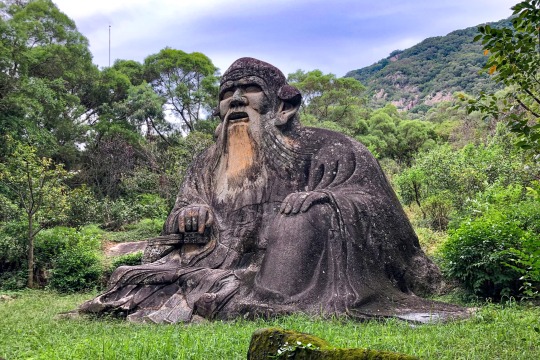
First let's post two of the three translations of Laozi 5 that I am working with just for clarity, starting with William Scott Wilson's and then Dan G. Reid's, respectively:
Heaven and Earth are not out to make friends; Thus, they treat all creatures as straw dogs. The sage is not out to make friends; Thus, he treats the people as straw dogs. Perhaps this is something like a bellows between Heaven and Earth: It is empty, but never exhausted; It moves, and creatures are manifested endlessly. A lot of words will get you nowhere; Better to just stay centered.
Heaven and Earth are not (willfully) benevolent. The myriad things are treated no differently Than grass for dogs. Sages are not (willfully) benevolent. The hundred clans are treated no differently Than grass for dogs. The gate of Heaven and Earth Is it not like a bagpipe? Empty yet not finished It moves, and again more is pushed forth. To speak countless words is worthless. This is not as good as guarding balance within.
(I will bounce back and forth with the terminology used here.)
The first few lines of this chapter may be interpreted harshly. Plainly and literally, it tells us to treat the Ten Thousand-kinds-of-entities as straw dogs, items used as offerings to Heaven, according to Zhuangzi, and are thrown away when the ceremony is done. Many may think treating the myriad of things as “straw dogs” is harsh, but it teaches equality and impartiality with one’s benevolence ( 仁 ).
Heaven and Earth are not here to be “kind” or out to gain favors from us and befriend us. Which is why all creatures are “straw dogs” to Heaven & Earth. All the Ten Thousand-kinds-of-entities have their own inherent allotted capacities. Once capacities are used up, we transform; we change, and we dissolve from our corporeality. However, our dissolution of corporeality is not equal to the literal discarding of a ritual straw dog. The straw dog is nonetheless fated to be thrown away at the end of the ceremony, with little thought about it. Likewise, we are fated to die. For we are all equal in this one fact: We will change, we will transform, we will die. We are never exempted from our Fate. I will so naively say that The Sage is absolutely aware of this. The Sage takes this impartial judgment of the myriad things and is equally benevolent to all things. More plainly, the Sage treats all people and sentient beings as equals. Not wishing to befriend anyone for the sake of societal piety/expectations or because of rank, but instead dealing with everyone based on their own natural capacities, treating all people and sentient beings with 仁, benevolence, because that is Heaven & Earth and the Sage’s nature. When the Sage embraces the One with Heaven and Earth, the Sage remains empty, so he can be at one with and “filled” with Heaven (Laozi 11 & 22).
When Heaven & Earth and the Sage are not out to “make friends” or are “un-willfully benevolent,” they too treat the Ten-Thousand-kind-of-entities as straw dogs because it is in their impartiality where true benevolence arises. True benevolence begins with a reversion back to one’s original nature (Zhuangzi chapter 2.14.22), which is brought about by embracing the One (執一). According to Wang Bi’s commentary in chapter 10 of the Laozi, this embracement of the One is the true nature of human beings. Wang Bi goes on to further suggest that this “embracement of the One” purifies the spirit to an extent that the Sage is never separated from the abode and the One. Being never separated from one’s original nature (Embracing the One), benevolence is not displayed for things such as societal expectations or because the Sage must show it due to a certain partiality toward another human being (a friend, brother, sister, mother, or father).
Instead, the Sage abides by the tenet: “When you complete a meritorious deed, he backs out and goes home, for this is Heaven's Way.” (Laozi 9.) The meritoriousness of The Sage is so great, that they never try to make themselves known, yet when the Sage does act with unconscious intent, "creatures are manifested endlessly." I take this to mean people will follow the Sages for instructions because of their genuine display of benevolence. They are not consciously trying to attract followers for the sake of fame. Still, the myriad things flock to the Sage nonetheless because of the extremely unconscious impartiality and equality the Sage shows to all things. Likewise, the Sage acts without fabrication; he doesn’t fabricate friendships with people for societal piety or to display that they have many friends. If the Sage is fated to become more intimate with people, they simply do, never fabricating a relationship for personal benefit or societal gain. Instead, Fate will forge a relationship or partnership with the Sage because it will be of true benevolence and an entirely natural union (Laozi 3).
The sage has no preferences. They have no partial inclination to another sentient being, person, or external force. For if they indeed are One with Heaven and Earth, All things are regarded as straw dogs, which I hope is clear now that "straw dogs" are nothing more than a metaphor to orate the equality and impartiality we all should strive for. We see in the Essential Huainanzi 1.5 that:
When perception comes into contact with things, preferences arise. When preferences take shape and perception is enticed by external things, our nature cannot return to the self, and the heavenly patterns are destroyed.
This is also why the Sage does not allow external things to entice him as being joyous (helpful) or despairing (harmful). Still abiding by that impartial and equal behavior as displayed in Laozi 5. As Zhongi says in the Outer Chapters of the Zhuangzi 20.27.1-3:
Hunger, thirst, cold, heat, and the obstacles of poverty, these are the doings of Heaven and Earth, emanated by the movement of fate. By this I mean they happen together in conjunction with them. A minister who serves his sovereign dares not evade his commands; therefore, since one upholds the way of the minister as attentively as this, how much more attentively should one treat Heaven!
All this means is that the Sage does not treat what we call "harm" as actual "harm." The Sage keeps in step with Heaven and Earth, abiding by extreme impartiality and equality, as echoed in Laozi 5 and Huainanzi 1.5. I assume the "Hundred Clans" refers to the Hundred Family Surnames, a text composed during the Song Dynasty that lists five hundred and seven Chinese surnames. So when the Sage treats the hundred clans no differently than grass for dogs [straw dogs], this is just a more specified way of reiterating the first phrase of Laozi 5 about the actual population of China.
So what does it mean when the passage tells us A lot of words will get you nowhere; Better to just stay centered, or To speak countless words is worthless. This is not as good as guarding balance within? Heshang Gong's commentary illuminates these sentences perfectly. Here it is with the Chinese and English.
多言數窮,多事害神,多言售身,口開舌舉,必有禍患。不如守中。不如守德於中,育養精神,愛氣務言。
Having too many duties harms the spirit. Speaking too many words does harm to oneself. When the mouth is open, and the tongue cleaves to the roof of the mouth, there is sure to be misfortune and worries. It is not as good as guarding De (德) within. Nurture and support your spiritual vitality, cherish your energy-breath, and speak infrequently.
Heshang Gong explains here that when one speaks many words, all they are doing is displaying benevolence and righteousness. I am reminded of the Sophist in Plato's dialogues. The Sophist speaks just to speak, acting like they are experts on the subject they are discussing. Sophists are imitators of knowledge, virtue, and justice (Sophist 267 b-c). This is what Heshang Gong is trying to elude too. Sophists harm themselves by displaying themselves as experts in the subjects they orate about. While Socrates and Plato use many words, they always assert that they are not saying or knowing anything. As such, by "not saying anything," Socrates guards his inner vitality and moral virtue (德 De/Te). Heshang Gong is further saying that by 育養精神, we must nurture our inner spirit in a way that leads us to fewer words, fewer desires, and less knowledge (Laozi 3).
With these passages in mind, I hope it is ever clearer why the Sage and Heaven & Earth treat the Ten Thousand-kind-of-entities as "straw dogs." Typing this out and laying out other supporting literature greatly aids my understanding, and I hope the same can happen for you, the reader.
#philosophy#daoism#taoism#chinese philosophy#zhuangzi#lao tzu#laozi#huainanzi#chuang tzu#plato#sophist
11 notes
·
View notes
Text
This was absolutely refreshing to read. Thank you
Putting It Into Practice: Relationships With The Numinous
My good friend Atefwepwawet from Roving the Two Lands, after reading my last few posts on saints and angels, demons, and drawing from Mediæval, Renaissance, and early Modern works, asked what I planned on doing with all my research, how much I was putting, or planning on putting, into practice. In short, like other friends before her she asked that all important question people like me can lose…

View On WordPress
6 notes
·
View notes
Text
God bless you OmE. Merry Christmas!!
Early Christmas Gift :) Virtue of Quranic Verses from National Library of France(free document)
Hello, I have finished translating a manuscript from the national library of France if people are interested in using it. I found the document to be very wonderful having myriads ways of working with the Quranic verses and having some theological basis in Hadith. Methods to empower one's own spirituality or learn alchemy, it is definitely interesting! I did try to keep the initial tone or some of the broken grammatical ways that the person wrote the text in it.
It's free!!
I hope you enjoy it :)
12 notes
·
View notes
Text
Musing on a line in Chapter 4 of the Laozi Along with a Comparative Study to the Chaldean Oracles.
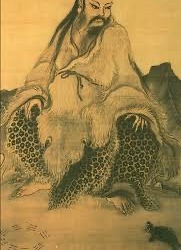
"Gentle and Overflowing, it always seems to be there” — William Scott Wilson.
"Tranquil! As though having a life of its own." — Dan G. Reid.
Commentary by Heshang Gong: 湛兮似若存。言當湛然安靜,故能長存不亡。
"This is to say that you should find tranquility and stillness at the depths of your nature. Then you will be able to endure and not die."
This whole chapter teaches on the humility of remaining ~empty.~ We make use of the Way by pouring out: emptying ourselves. The Dao is an Empty vessel, never making itself known or displaying it’s merits for creating and accomplishing all things. By doing so, the Dao is never is overfilled, and by remaining empty it creates and is responsible for everything. I think this teaching may be reflected in Xiu Dao practices, where a person statically removes themselves from all worldly concerns and attachments, to cultivate 道. From the videos and things I’ve read about Xiu Dao (Daoist Meditation), it is a process of emptying oneself. Being and remaining empty, keeps us unlimited in our capacities. But first one must asses, and abide in ones own nature 人性 —Zhuangzi 8.3.1, before such emptying can occur — or so I think.
On the topic of “empty.” We see this same sentiment reflected in the Chaldean Oracles fragment 1. Here it is as translated by Ruth Majercik:
"You must not perceive it intently, but keeping the pure eye of your soul turned away, you should extend an empty mind toward the Intelligible in order to comprehend it, since it exists outside of your mind."
(I’m drawing on commonalities, never universalities, which should be the standard for comparative religious studies.)
Here in Chaldean Oracles, we see we must too become an empty vessel and empty our mind for us to elevate our soul to the abodes of the gods — this is theurgy. The elevation of our soul to the gods, to Nous, and ultimately back to The One. It seems to preach a reversion of our mind in order for it to ascend to the Intelligible. A pretty neat commonality in the practice of Theurgy and cultivation techniques found in Daoism! Yet these two practices/spiritual techniques have different goals in mind. One does not “ascend” to the Dao, as one “ascends” to the gods, to Nous and finally The One, as we do in theurgical rituals. In Daoism, we have to embody the Dao and make ourselves receptacles by extreme emptying techniques to be able to receive the Dao’s incomprehensible nature. Emptying is not a big theme in Hermeticism and I can’t find anything related to “emptying” oneself to reach The Good that is The One (God). Only reference I find is in the Chaldean Oracles fragment I have quoted above, which is only kind of Hermetic, as it draws influences from many Mediterranean based mysticisms. Where it is similar is that it follows a platonic notion of “like becoming like.” But how we become like the Dao is different from how we become like the gods and The One. None the less, I find this commonality beautiful and I celebrate and participate in its differences.
You can also read about another commonality I make between Daoism’s “abiding and trusting one’s own nature 人性” and how the god Hebo was able to do such a thing. Hermeticism’s CH I: Poimandres dialogue on paragraph 19 we see how one who recognizes himself, attains the chosen Good, which is God (The One). Here it is. I analyze chapter 17 of the Zhuangzi in this link, and very briefly touch on how this is similar to the concept of “know thyself” in Hermeticism, but give no textual references to such claims in the Hermetica. Those textual references can be found all up and down the Corpus Hermeticum but a good place to start is the Poimandres Dialogue (CH I).
I must remind you all that I have no teacher for these kinds of things. Also, in no way am I claiming that Daoism and Hermeticism/Neoplatonism are universal in their goals or approaches and practices. So any insights and corrections are very welcome here🙏
#daoism#taoism#zhuangzi#lao tzu#philosophy#laozi#meditation#hermeticism#theurgy#Heshang Gong#Xiu Dao#hermetica
4 notes
·
View notes
Text
New Translation! Traveling Magic! Kefitzat haderech/Tay Al Ard.
I am happy to announce my new translation of traveling using magic. I would have made it free but considering my spirits emphasized on putting a price tag on it, I put it on a 3$ minimum and pay what you want basis. This is the first time I see a method that doesn't need long fast or absurd requirements for it!
All Credits and prayers goes to the original Sheikh (January) who found the method and the omani magicians wo found out this techniques, Amen.

11 notes
·
View notes
Text
Saints and Angels as a Polytheist
This post in many ways continues my series on Hermetic Heathenry, building upon many of the ideas therein. If unfamiliar, I would advise you to give those posts a look over first. It also serves to take the place of the long-standing draft post I have had sitting for years on the topic of spirits, as notions of celestial hierarchies, a God’s series, and so on are all addressed…

View On WordPress
7 notes
·
View notes
Text
Hermetic Meritorious & Demeritorious Exercise to Prepare for Rebirth.
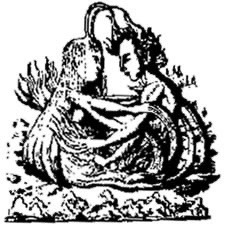
This is a practice I’ve been doing for a little over a month now, which is a more Chinese-Daoist/Buddhist practice of listing out ones demerits and merits that one has committed throughout the day, or week or month. It’s not really occult or esoteric — sorry :p
It builds off the idea of a Folk-Daoist concept of Ganying 感應 or correlative resonance. Basically cause and effect. https://en.wikipedia.org/wiki/Ganying
Typically I follow the lists of Merits and Demerits from the 文昌帝君陰騭文/Wenchang's Treatise on Secret Merit & 太上感應篇 Taishang Ganying Pian, respectively, to go off of what is “meritorious” and “demeritorious.”
I highly recommended you all check out @edwardW2 (on Twitter) compilation of three different translations of each text
https://edwardwhite123.blogspot.com/2022/03/wenchangs-treatise-on-secret-merit.html
https://edwardwhite123.blogspot.com/2022/05/taishang-ganying-pian-three-translations.html
While there is no such practice in the realm of Greco-Egyptian Hermeticism, at least that I am aware of, this practice of 感應 can easily be applied to a Hermetic praxis/setting.
Particularly in Corpus Hermeticum XIII.7-9. Here we are presented with the 12 Irrational Tormentors and the 10 Divine Liberators of said Tormentors.

So with a sheet of paper, you can list all the times throughout your day, week or month, you were:
1. Ignorant
2. Stricken with Grief
3. Incontinent (lost control of your emotions)
4. Lustful
5. Unjust
6. Greedy
7. Deceitful
8. Envious
9. Treacherous
10. Angry
11. Reckless
12. Malicious
Likewise, we can record our merits or “Liberators” in a Hermetic setting by:
1. Acknowledging when Knowledge has dispelled our Ignorance
2. Recognize when we were Joyous to dispel our Grief
3. Acknowledged when we had Continence over our emotions.
4. When we Persevered through Lustful temptations.
5. When Justice prevailed our once unjust attitude and actions.
6. When we displayed Liberality over our Greed.
7. Record when we were earnestly Truthful, to dispel Deceitful Behavior.
In CH XIII.9, once Truth has arrived to us throughout the day, week or month, together with the Good, life and light (the remainder of the Three Divine Liberators), Hermetic Rebirth is achieved!
What you do with the piece of paper is up to you. You could keep them for tracking your moral progression, or you could burn the paper like I do. (🔥USE FIRE SAFETY. PLEASE.🔥) I burn the paper because it is a symbolic releasing of these good and bad deeds, as I do not wish to harbor good deeds and become pretentious. Likewise, harboring bad deeds will only bring us more grief.
The cause: Recording our daily, weekly or monthly Tormentors and Liberators.
The effect: A preparation for Hermetic Rebirth.
While this Hermetic Rebirth is a central theme in CH XIII. Who says we cannot undergo a sort of spiritual rebirth everyday, or every week or, every month? (Psst…we most certainly can, and I personally think that is the point of “Hermetic Rebirth.”) Spiritual Rebirth is not just a one and done thing. It’s a life long process that I, a Hermeticist, must and will continue to undergo.
I think using Corpus Hermeticum XIII is a great way to daily, weekly, or monthly record our merits and demerits. It’s a practice that builds integrity and moral fortitude. And ultimately leads to a Spiritual Rebirth. I’m not suggesting at all that Hermetic literature and PGM practices, and other technical Hemerticas can cause or not cause moral integrity and fortitude, just that there is a lack of structure and praxis for dispelling the Tormentors, which is not always a bad thing — the lack of structure I mean.
As a Hermeticist I use the structure of practices that come from various traditions — see my post on the Christian Meditative practice called Lectio Divina. My noetic theurgy, called the Silent Prayer, closely resembles Dhikr, which is a Muslim meditative practice that involves reciting the 99 names of Allah. This is just the reality for us Hermeticist — lack of structural praxis! Again this is not a bad thing. Just through the course of time and suppression of beliefs, we do not have alot of surviving structural practices for a “Hermetic Praxis.” It is what is. But the lack of structure gives us, the practitioners, the power and opportunity to build a valid and authentic spiritual praxis that’s very customizable, and substitutable for our contemporary lives! Which is a very beautiful process to undergo, personally.
If you all need more help in structuring a Hermetic Praxis — please check out @polyphanes Kofi shop and buy his Preces Templi e-book.
I hope this exercise serves everyone well whether you use the traditional Chinese list of Merits and Demerits, or if you wish to use CH XIII.7-9. Gods bless you all.
11 notes
·
View notes
Text
The Drunk and The Perfected One.
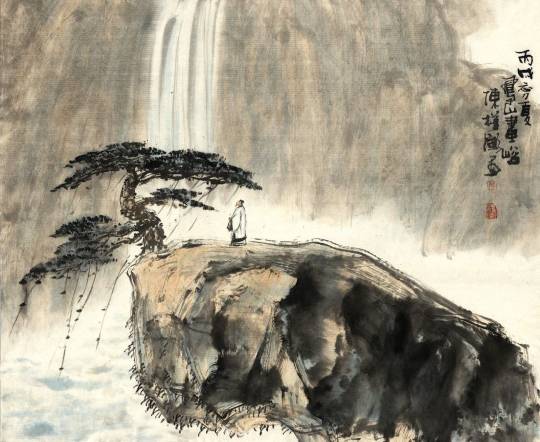
Reading chapter 19 of the Zhuangzi 達生, Understanding Life, we come across a story of a drunk man riding in a carriage, he then proceeds to fall out of the high-moving carriage. However, when he fell out, he was not aware of such an occurrence. He did not fear for his life, nor was concerned with dying. Though he has the same joints and bones as the next person, he does not fear getting hurt. All of this was achieved thanks to the booze.
Now, this is not an excuse to be constantly drunk all the time. The drunk's lack of awareness (being drunk) was brought about by externals; not becoming unselfconscious spontaneously.
Here is the exact quote from Zhuangzi 19.5.1-2:
"When a drunk falls out of a carriage, though it is going fast, he does not die. He has the same bones and joints of others, but when it comes to getting hurt, he is different from them, for his spirit is perfectly whole. He was not even aware he was riding in a carriage, so when he fell out, he was not aware of that either. Alarm for life and death did not enter his breast, which is why such a one could be so at odds with things and yet feel no fear. Since he could achieve such perfect wholeness thanks to drink, how much better could he achieve such perfect wholeness from Heaven?! The Sage hides himself in Heaven, thus no one can harm him."
The one who abides in drink or drugs to achieve this state of "wholeness of spirit" will ultimately fail, once the bottle or baggie runs dry. Yet in those drunken states, they appear very similar to those who abide in Heaven to become whole. The bottle or baggie will always run dry, but Heaven is eternal. The one hiding in the bottle is like the one hiding in Heaven. Because when you get drunk or high, there is no care for the self, body, or life or death. Where they differ is the substance of achieving this notion of discarding the body and distinctions. For the drunk abides in the limited amounts that are contained in their bottle, the Sage abides in Heaven which is boundless, and limitless.
This is the comparison that Master Zhuang is trying to make with the Drunk and The Perfected One. The Drunk and Perfected One achieve similar states of "wholeness" by different means. Though the drunk will become dismembered once the bottle empties, Heaven never runs dry for the Sage or Perfected One. This is why the Perfected One never fails to be Whole, all the time. They abide by a substance that is not a substance. The Sage becomes whole in their extreme sobriety via abstinence and fasting.
The drunk cast away worldly concerns at the cost of his body and mind. The Sage casts away worldly concerns and distinctions by letting go, and letting Heaven take the reigns. Thus, the Sage preserves their material body by discarding the world and its distinctions; and by abiding in Heaven's natural distinctions. In 19.2.1-2, we see this:
"If one wishes to avoid tending to the body, nothing is better than to abandon worldly concerns. Once worldly concerns are abandoned, one is free of entanglements; once free of entanglements, one is true and equitable; once true and equitable, one is reborn therewith; once reborn, one is almost complete. But why is it worthwhile to abandon worldly affairs, and why worthwhile to discard concerns for life? Once one has abandoned worldly affairs, the body is no longer strained; once one has discarded concerns for life, the vital essence is no longer depleted."
All this means that when we abide in Heaven and not the bottle to achieve a wholeness of spirit, we can be reborn or renewed daily. As for why we abandon worldly affairs and distinctions, we do this because they are not Heaven's distinctions, to put it plainly. Master Zhuang says in Chapter 2.14.1 齊物論, "The Dao has no boundaries." Meaning just that, The Dao has no distinctions or things that bind it to one "thing." Later in 2.14.11, Master Zhuang says, "Therefore in such "division" there is a failure to divide; in such "distinction" there is a failure to distinguish."
The drunk achieve their wholeness of spirit by means of initiating the human distinctions, for they are only truly joyful while drunk. The Sage or Perfected One achieves a wholeness of spirit by means of initiating the natural, thus, they invest in life with virtue (19.6.1-3). The drunken one does not abide by their natural principle, and thus, they have to overconsume drink to achieve states similar to the Sage or Perfected One. The Sage abides in nothing of the sort. They abide or hide in Heaven. To "hide" in Heaven means, according to Guo Xiang, "He does not sneak looks out from within his own natural capacity, which is why the text says "hide." The drunk uses conscious knowledge to get drunk and thus achieves a "wholeness of spirit," but this wholeness of spirit is an illusion, and the illusion fades ever away as they sober up. I imagine this character who fell out of this high-moving carriage was pretty sore once he sobered up. Though the Perfected One abides in no such conscious action or knowledge; instead abides unconsciously with Heaven and its natural distinctions, and no such conscious use of knowledge, and thus is never harmed. This is why the Perfected One may maintain such a state of pure Joy as described in the previous chapter of the Zhuangzi, 至樂 Perfect Enjoyment. The Sage, being One with Heaven and Earth and not with human things such as drugs or bottles of booze, can be truly joyful. Which has nothing to do with happiness or sadness, but more on that can be read up here on my Twitter.
So, in conclusion, the point here is that while the Drunk and The Perfected One may appear to achieve similar states of being, one is obviously an illusion brought about by conscious effort and knowledge (The Drunk). While the Perfected One achieves their wholeness of spirit through unconscious effort, wu-wei 無為. The Perfected One abides in the unknowable bounds of Fate and Heaven. And is thus able to not be harmed by anyone or anything.
6 notes
·
View notes
Text
Good deeds, virtues don't sell.
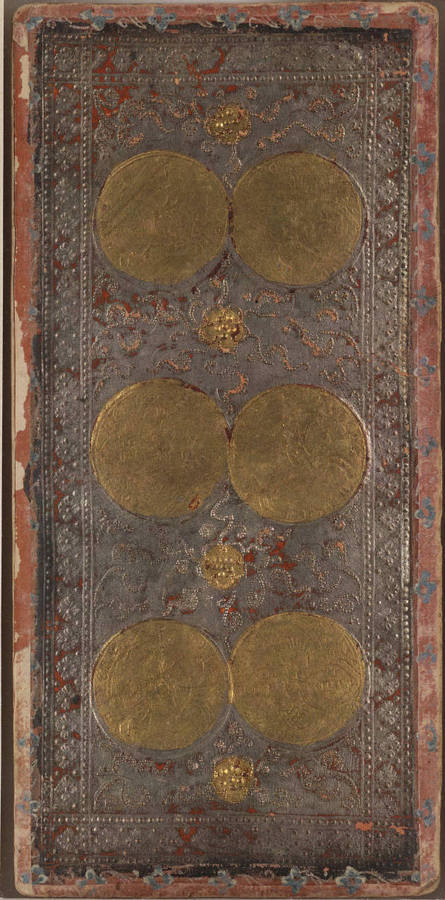
The idea of talking about Virtues and Good deeds isn't as big or popular but it's a good enough topic that I feel deserve a post here. Mainly that the results from our livelihood deserve this aspect of action in the world...that sounded a bit weird writing it out. What I am saying is that your action in the world, your behavior with other, and a lot of the stuff you do "off the cushion" or "with normies" matter a lot when you go and do the rituals or even meditate.
The essence of all the practices is some kind of finicky adjustment and the real meat is what you do when you talk to people, when you act with people, and how this feed back into the whole equation. It doesn't matter how you talk to random people politely, what matter is how you talk, deal, and act with people close to you.
What are you doing in the world, how are the stuff manifesting in the world, is it all internal? you have to ask yourself these questions.
"The wrong person even with the right knowledge will come to no good end. But the right person even with the wrong (or incomplete) knowledge will make it work."
Some people might think of it as "oh I don't have a lot of money", it's not even about the money, if not by the money then you can help with time, with effort, with talking, with guiding, etc. It's not about always gain and loss in that sense. I think you can see it yourself, but if you don't do anything bad or anything good which is most of population they just tend to "blob" along the sea of life not sinking nor floating, most of their action are morally ambivalent or not even considered "actions" just motions.
Paul Sedir in his book about how to Pray have a very good quote on this:

To make ourselves heard, our heart must speak the language of Heaven, and that language is charity; our person must become aware of his nothingness, and in this inner void infinity rushes in to fill it. Thus, belief is not enough; believing in God and not obeying Him is what only too many Christians do. I prefer those who claim not to believe yet obey the Divine Law. Praying without previously performing an act of charity can do nothing; whereas charity without faith still moves Heaven. Remember the wonderful stories of the Prodigal Son and the Good Samaritan. It isn’t faith that begets charity, it is charity that begets faith. Faith isn’t an opinion of the brain, it’s a conviction of the heart. To have faith in someone isn’t to believe that the person exists; it’s to trust them, and to trust them wholeheartedly.
Faith means love of God, as charity means love of one’s fellow beings. These two flames grow through one another and feed one another.
I hope, this doesn't remove the importance of the experiences, the rituals, the practices, and so on. One of my friend said he didn't appreciate the Quran or wasn't moved by the Quran until he worked with Jaljalutiya prayer. So again it's a very tricky situation, there's no one way to crack this egg and some people who over-emphasize the charity too soon don't realize it could be a bit too bad for the people who didn't have the experience or understand why they would do that. I am not telling you to go out right now and do charity just because you read it in the internet, but think about it and contemplate it.
Just like Paul Sedir said, they're two flames(prayer and Faith) working in conjunctions, your rituals, invocation, spellwork, etc AND your behavior irl, how you deal with people and how people see you, your actions, thoughts, and words. You can't just practice 1 hour a day and do shit for the rest of the 23 hours. The WHOLE thing is your practice.
Let me end this two points, first a quote and lastly a technique. The Quote from G.O Mebes' Minor Arcana course:
An isolation for too long could harden your heart and damage the intuition. A period of self-analysis lasting too long, developing the principle of reason, could take place at the cost of sensitivity, which is also necessary. This is the first danger that the disciple encounters on the Way and that you need to avoid, instituting an adequate "modus vivendi" in your environment. Ethical Hermeticism teaches that it is preferable to take just one step forward and advance your environment - even a tenth part of that step - than to take ten steps, giving nothing to the environment. It is by giving that man receives.
The technique is either the Planetary Charity which you can read about extensively here and the other one is that aim to just do one good deed a day, to counsel a friend, to drop one cent in a charity box, to pray for the dead, or to help a friend with a problem. Again, Charitable and good deeds have a lot of ways to come about them so why not try praying to be in the position to help people ;) maybe that prayer can be answered.
May the Divine Creator open the way for us to help one another as brothers and sisters.
Sincerely,
From the Heart.

21 notes
·
View notes